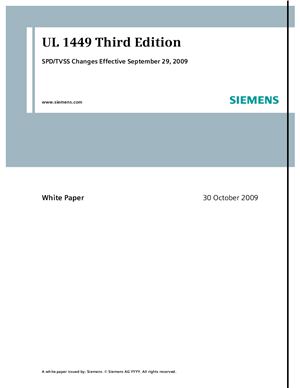2 страницы
SPD/TVSS Changes Effective September 29, 2009
UL 1449 has undergone extensive revision as surge suppression’s standard for safety. UL 1449 Third Edition, defines performance testing and nomenclature, which effectively reboots the surge industry. UL 1449’s performance testing provides a way to compare newly evaluated Surge Protective Devices (SPDs), formerly known as Transient Voltage Surge Suppressors (TVSS). These changes became effective September 29, 2009, which predictably impacts specifiers
and the supply chain as follows:
New performance tests use more surge current, making let-through voltages increase
New test results are numerically higher, thus not meeting old-style specifications
Electrical & General Contractors and Distributors might waste time trying to source SPDs that cannot meet an out-dated specification
In frustration, Old/Obsolete TVSS may be submitted, which may or may not be UL Listed, or supported in the future
Specifying Engineers might waste time evaluating submittals
Specifying Engineers may not be getting what they want, or what they think they’re getting
SPD/TVSS Changes Effective September 29, 2009
UL 1449 has undergone extensive revision as surge suppression’s standard for safety. UL 1449 Third Edition, defines performance testing and nomenclature, which effectively reboots the surge industry. UL 1449’s performance testing provides a way to compare newly evaluated Surge Protective Devices (SPDs), formerly known as Transient Voltage Surge Suppressors (TVSS). These changes became effective September 29, 2009, which predictably impacts specifiers
and the supply chain as follows:
New performance tests use more surge current, making let-through voltages increase
New test results are numerically higher, thus not meeting old-style specifications
Electrical & General Contractors and Distributors might waste time trying to source SPDs that cannot meet an out-dated specification
In frustration, Old/Obsolete TVSS may be submitted, which may or may not be UL Listed, or supported in the future
Specifying Engineers might waste time evaluating submittals
Specifying Engineers may not be getting what they want, or what they think they’re getting

